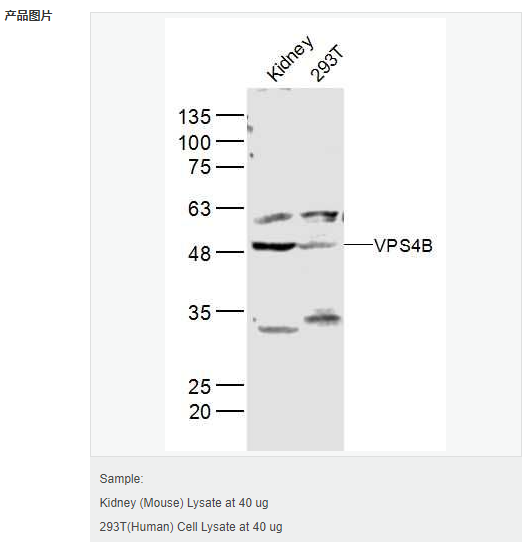

貨號
產品規格
售價
備注
BN40390R-100ul
100ul
¥2360.00
交叉反應:Human,Mouse(predicted:Rat,Pig,Cow) 推薦應用:WB,IHC-P,IHC-F,ICC,IF,ELISA
BN40390R-200ul
200ul
¥3490.00
交叉反應:Human,Mouse(predicted:Rat,Pig,Cow) 推薦應用:WB,IHC-P,IHC-F,ICC,IF,ELISA
產品描述
| 英文名稱 | VPS4B |
| 中文名稱 | 液泡蛋白分選蛋白4B抗體 |
| 別 名 | 8030489C12Rik; Cell migration inducing 1; Cell migration-inducing gene 1 protein; MGC116271; MIG1; Protein SKD1; Skd1; SKD1B; Suppressor of K(+) transport growth defect 1; Suppressor of K+ transport defect 1; Vacuolar protein sorting 4 homolog B (S. cerevisiae); Vacuolar protein sorting 4 homolog B; Vacuolar protein sorting 4b; Vacuolar protein sorting-associated protein 4B; Vacuolar protein sorting-associating protein 4B; VPS4 2; VPS42; Vps4b; VPS4B_HUMAN. |
| 研究領域 | 細胞生物 信號轉導 轉運蛋白 跨膜蛋白 |
| 抗體來源 | Rabbit |
| 克隆類型 | Polyclonal |
| 交叉反應 | Human, Mouse, (predicted: Rat, Pig, Cow, ) |
| 產品應用 | WB=1:500-2000 ELISA=1:5000-10000 IHC-P=1:100-500 IHC-F=1:100-500 ICC=1:100-500 IF=1:100-500 (石蠟切片需做抗原修復) not yet tested in other applications. optimal dilutions/concentrations should be determined by the end user. |
| 分 子 量 | 49kDa |
| 細胞定位 | 細胞膜 |
| 性 狀 | Liquid |
| 濃 度 | 1mg/ml |
| 免 疫 原 | KLH conjugated synthetic peptide derived from human VPS4B:301-400/444 |
| 亞 型 | IgG |
| 純化方法 | affinity purified by Protein A |
| 儲 存 液 | 0.01M TBS(pH7.4) with 1% BSA, 0.03% Proclin300 and 50% Glycerol. |
| 保存條件 | Shipped at 4℃. Store at -20 °C for one year. Avoid repeated freeze/thaw cycles. |
| PubMed | PubMed |
| 產品介紹 | The protein encoded by this gene is a member of the AAA protein family (ATPases associated with diverse cellular activities), and is the homolog of the yeast Vps4 protein. In humans, two paralogs of the yeast protein have been identified. The former share a high degree of aa sequence similarity with each other, and also with yeast Vps4 and mouse Skd1 proteins. Mouse Skd1 (suppressor of K+ transport defect 1) has been shown to be a yeast Vps4 ortholog. Functional studies indicate that both human paralogs associate with the endosomal compartments, and are involved in intracellular protein trafficking, similar to Vps4 protein in yeast. The gene encoding this paralog has been mapped to chromosome 18; the gene for the other resides on chromosome 16. [provided by RefSeq, Jul 2008] Function: Involved in late steps of the endosomal multivesicular bodies (MVB) pathway. Recognizes membrane-associated ESCRT-III assemblies and catalyzes their disassembly, possibly in combination with membrane fission. Redistributes the ESCRT-III components to the cytoplasm for further rounds of MVB sorting. MVBs contain intraluminal vesicles (ILVs) that are generated by invagination and scission from the limiting membrane of the endosome and mostly are delivered to lysosomes enabling degradation of membrane proteins, such as stimulated growth factor receptors, lysosomal enzymes and lipids. In conjunction with the ESCRT machinery also appears to function in topologically equivalent membrane fission events, such as the terminal stages of cytokinesis and enveloped virus budding (HIV-1 and other lentiviruses). Subcellular Location: Prevacuolar compartment membrane. Late endosome membrane. Membrane-associated in the prevacuolar endosomal compartment. Localized in HIV-1 particles purified from acutely infected cells. Tissue Specificity: Ubiquitously expressed. Post-translational modifications: Phosphorylated upon DNA damage, probably by ATM or ATR. Similarity: Belongs to the AAA ATPase family. Contains 1 MIT domain. SWISS: O75351 Gene ID: 9525 Database links: Entrez Gene: 9525 Human Entrez Gene: 20479 Mouse Omim: 609983 Human SwissProt: O75351 Human SwissProt: P46467 Mouse Unigene: 126550 Human Unigene: 18705 Mouse Unigene: 483448 Mouse Important Note: This product as supplied is intended for research use only, not for use in human, therapeutic or diagnostic applications. |
